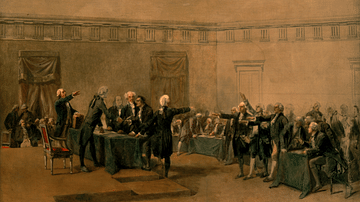Review

| Rating: | |
|---|---|
| Title: | American Exceptionalism: A New History of an Old Idea |
| Author: | Ian Tyrrell |
| Audience: | University |
| Difficulty: | Medium |
| Publisher: | University of Chicago Press |
| Published: | 2022 |
| Pages: | 288 |
In this work, Ian Tyrrell, a renowned scholar and professor of American History, shows how the concept of American exceptionalism became ensconced in the American imagination and belief throughout its history. This is a serious work based on extensive primary research and deserves to be a required read for any student of American history and culture.
In framing his discussion of American exceptionalism, the author employs two methodological approaches referencing Seymour Martin Lipset, a social scientist, and Mircea Eliade, a philosopher. Lipset, the author holds, evaluated the U.S. against other countries to develop a value behind American exceptionalism rooted in “liberty, egalitarianism, individualism, populism and laissez-faire.” Likewise, Eliade’s typology of myths as culture-enforcing sacred stories, Tyrrell states, explains how American exceptionalism can be interpreted as “a myth rooted in the recorded history of national institutions.” Using these two approaches, Tyrrell asserts that American exceptionalism is a combination of fictional tales and social experience.
Using this conceptual framework, Tyrrell's analysis is a chronological and historical review of the interpretation of exceptionalism from colonial times until recent decades in the U.S. His extensive use of primary research materials, including first-hand accounts of historical figures, provides considerable persuasiveness. The addition of a bibliography would have enhanced his research and complemented his use of extensive notes for each chapter.
According to Tyrrell, initially, the idea of American exceptionalism was conceived as a genuinely new and unique experiment free of the shackles of the Old World. The Puritans brought both a new link between church and government as well as many forms of individualism.
The American Revolution, Tyrrell holds, reinforced the idea of exceptionalism by signaling a clean break from monarchy. He cites how Thomas Paine captured the sentiment of the new nation in his Rights of Man (1791): “As America was the only spot in the political world where the principle of universal reformation could begin, so also was it the best in the natural world.”
Tyrrell documents how after the Revolution, the concept gained spatial, cultural, economic, religious, and military dimensions over the next hundred years. Jefferson invoked the Old Testament imagery of "Promised Land;" Ralph Waldo Emerson, in The American Scholar (1837), called for fostering a national cultural identity; Manifest Destiny served as a justification for removing Native Americans, Mexicans, and other groups in a way that the Congregationist Horace Bushnell called “a positive force for Christianity.”
To Tyrrell, every exceptionalism idea has also led to a parallel trend of self-reflection. He cites John Adams's lamentation in 1814, saying "But after all, it will be but flattery, and the delusion, the self-deceit of the Pharisee.” Likewise, Tyrrell reminds us that the opponents of slavery, such as William Lloyds Garrison, attacked American institutions as “compromised by evil and incompatible with God’s word and spirit."
Unlike what some more liberal scholars have claimed, Tyrrell refutes that the New Deal is an example of 20th-century American exceptionalism. He points out that the U.S. was a laggard in implementing social safety nets that many industrial nations had adopted much earlier. Indeed, one could argue that the absence of universal health care in the U.S. today is a direct legacy of a major shortcoming of the New Deal.
Tyrrell observes that while other nations have their versions of exceptionalism, it is the U.S. economic and military power along with its entertainment and mass consumer product exports that provide extra believability to the notion of U.S. exceptionalism.
The author finds it ironic that the voice for American exceptionalism gets louder when the “material and moral evidence” seems to have dissipated. Indeed, with the massive wealth gap, ever-increasing gun violence, staggering drug overdose deaths, widespread homelessness, frequent political infighting, and the globe’s highest incarceration rate, "American exceptionalism" might very well sound more like hubris.
Tyrrell, an emeritus professor of history at the University of South Wales, offers a critical book based on meticulous research. This study's primary value is in showing how diverse groups have used American exceptionalism for self-serving expediency or manipulation. It also warns about the dangers of living in a world of self-delusion with potentially negative or unforeseen consequences.
About the Reviewer
Cite This Work
APA Style
Chaudhuri, S. (2024, January 16). American Exceptionalism: A New History of an Old Idea. World History Encyclopedia. Retrieved from https://www.worldhistory.org/review/390/american-exceptionalism-a-new-history-of-an-old-id/
Chicago Style
Chaudhuri, Shankar. "American Exceptionalism: A New History of an Old Idea." World History Encyclopedia. Last modified January 16, 2024. https://www.worldhistory.org/review/390/american-exceptionalism-a-new-history-of-an-old-id/.
MLA Style
Chaudhuri, Shankar. "American Exceptionalism: A New History of an Old Idea." World History Encyclopedia. World History Encyclopedia, 16 Jan 2024, https://www.worldhistory.org/review/390/american-exceptionalism-a-new-history-of-an-old-id/. Web. 23 Apr 2025.




